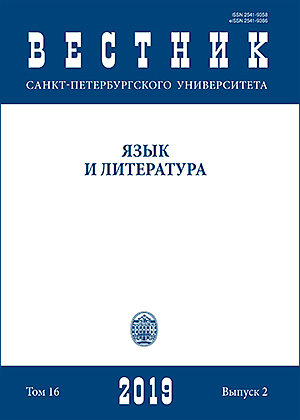Problems in the development of professional communicative competence in socially oriented spheres of activity — the example of typical mistakes in the use of the state language of the Russian Federation in legal documents
DOI:
https://doi.org/10.21638/10.21638/spbu09.2019.205Abstract
The article suggests that state standards for general and vocational education should provide mandatory training in communication skills in Russian in various special fields. First of all, it is necessary to develop skills in how to use Russian as the state language for the Russian Federation. The acquired skills are expected to ensure reliable social communication between the authorities and citizens. The article presents basic requirements for Russian when used in legal acts: certainty, clarity, and intelligibility to a wide audience. The article provides results of a comprehensive study, carried out by St. Petersburg University, of legal acts issued in 2014– 2015 in eleven regions of the Northwestern Federal District of the Russian Federation. Types of speech errors found in the texts of these normative acts are singled out, and the significance of the errors is assessed from regarding the risk of social communication disorders. For this purpose we prepared a list of stylistic errors in business language. Among these: semantic violations of compatibility, wrong case forms, formal errors and semantic matching parts of a sentence, the prepositional selection error control, errors of usage, violation of stylistic unity, and genre of the text. The evaluation of the significance of certain errors regarding risk to social communication disorders is provided. It is argued that the purpose of language policy in the field of education should improve the quality of oral and written language in various fields of professional activity.
Keywords:
communicative competence, academic literacy, normative acts, speech errors, norms of the state Russian language
Downloads
References
Литература:
Белов, Кропачев, Соловьев 2017 — Белов С. А., Кропачев Н. М., Соловьев А. А. Разработка концепции и нормативно-правовое обеспечение государственной языковой политики Российской Федерации. Вестник СПбГУ. Право. 2017, 8 (1): 42–61.
Государственный язык 2018 — Государственный язык России: нормы права и нормы языка. Белов С. А., Кропачев Н. М. (ред.). СПб.: Изд-во СПбГУ, 2018. 126 с.
Короткина 2009 — Короткина И. Б. Грамотность в век информационных технологий: в поисках концептуального единства. Образование и общество. 2009, 4 (57): 125–129.
Сиротинина 2009 — Сиротинина О. Б. Типы речевых культур в профессиональной деятельности человека. В кн: Чтобы Вас понимали: культура русской речи и речевая культура человека. Сиротинина О. Б. (ред.). М.: Либроком, 2009. С. 120–128.
Сиротинина 2013 — Сиротинина О. Б. Русский язык: система, узус и создаваемые ими риски. Саратов: Изд-во Сарат. ун-та, 2013. 116 с.
Кузьмина, Соколов 2007 — Кузьмина Е. М., Соколов В. М. Формирование коммуникативной компетентности студентов вуза. Нижний Новгород: ВГИПУ, 2007. 176 с.
Смирнова, Щемелева 2015 — Смирнова Н. В., Щемелева И. Ю. Роль письма в современном университете: анализ зарубежной практики обучения академическому письму. Вестник СПбГУ. Серия 9. 2015, 2: 185–197.
References
Белов, Кропачев, Соловьев 2017 — Belov S. A., Kropachev N. M., Solov'ev A. A. .[Development of concept of and regulatory support of the state language policy of the Russian Federation]. Vestnik SPbGU. Pravo. 2017, 8 (1): 42–61. (In Russian)
Государственный язык 2018 — Gosudarstvennyi iazyk Rossii: normy prava i normy iazyka. [The official language of Russia: legal norms and language norms]. Belov S. A., Kropachev N. M. (ed.). St. Petersbur.: St. Petersburg State University Press, 2018. 126 p. (In Russian)
Короткина 2009 — Korotkina I. B. [Literacy in the Age of Information Technology: Looking for conceptual unity]. Obrazovanie i obshchestvo. 2009, 4 (57): 125–129. (In Russian)
Сиротинина 2009 — Sirotinina O. B. Tipy rechevykh kul'tur v professional'noi deiatel'nosti cheloveka. [Types of speech cultures in human professional activity]. In: Chtoby Vas ponimali: kul'tura russkoi rechi i rechevaia kul'tura cheloveka. Sirotinina O. B. (ed.). Moscow: Librokom Publ., 2009. P. 120–128. (In Russian)
Сиротинина 2013 — Sirotinina O. B. Russkii iazyk: sistema, uzus i sozdavaemye imi riski. [Russian language: system, usage and the risks they create]. Saratov: Saratov State University Press, 2013. 116 p. (In Russian)
Кузьмина, Соколов 2007 — Kuz'mina E. M., Sokolov V. M. Formirovanie kommunikativnoi kompetentnosti studentov vuza. [Formation of communicative competence of university students]. Nizhnii Novgorod: Volga State Engineering and Pedagogical University Press, 2007. 176 p. (In Russian)
Смирнова, Щемелева 2015 — Smirnova N. V., Shchemeleva I. Iu. [The role of writing in a modern university: an analysis of foreign practice of teaching academic writing]. Vestnik SPbGU. Seriia 9. 2015, 2: 185–197. (In Russian)
Downloads
Published
How to Cite
Issue
Section
License
Articles of "Vestnik of Saint Petersburg University. Language and Literature" are open access distributed under the terms of the License Agreement with Saint Petersburg State University, which permits to the authors unrestricted distribution and self-archiving free of charge.






